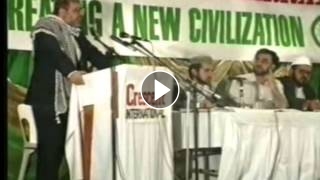



Allah describes the noble messenger (pbuh) as the “best of exemplars”. We would do well to study his Sunnah and Sirah properly to imbibe his lofty characteristics in our lives. Many Muslims expect the world to respect the Prophet they ignore.
The Qur’an is not a biography of the Prophet Muhammad (pbuh), but Allah (swt) describes His beloved Messenger (pbuh) in the most beautiful terms in the noble Book. He is the “best of exemplars” (33:21), with “the most lofty character” (68:04), and a “mercy to all the worlds” (21:107). He is the one who has “brought glad tidings inviting people to Allah” (33:45) “to bring them out of darkness and into light” (65:11).
The Saudis have repeatedly brought up the subject of destroying the Green Dome over the Prophet’s (saws) tomb and relocate his body from there. How diabolical can they get?
The Saudis do not consider anything to be sacred. In their drive to build concrete and steel structures so that the so-called royals can make money, they are planning to demolish the last vestiges of Prophetic history. Now they have plans to demolish the house where the Prophet (pbuh) was believed to have been born. A massive shopping complex will be built on the site.
How the Prophet (saws) acquired and exercise power is an aspect of the Sirah that has not been properly studied by Muslims. There is need to look at both the soft and hard power dimensions of the Sirah. Muslims celebrate the birthday of the noble Messenger of Allah (pbuh) in the month of Rabi‘ al-Awwal. These often include na‘at and nasheed recitals. Lectures, if included, narrate the miracles he performed. There is, however, seldom any discussion of the power dimensions in the Sirah as part of his life-struggle. Zafar Bangash, Director of the Institute of Contemporary Islamic Thought, discusses some of these issues.
We will continue to accompany Allah’s Prophet and to understand where we have in the past failed to understand him. In the past hundred, two hundred years we suffered from a failure in understanding him. We seek to rehabilitate ourselves, to refresh our minds (and) to energize our conscience (and) to understand what he stood for. The Prophet of Allah, we all know, reached a time in which it was no longer possible to have a peaceful of even a normal relationship between him and those who are with him on one side in Makkah and the rest of Makkah on the other side. There comes a time when this has to happen. If this doesn’t happen in our lives then there is a failure on our part to fulfil the character of Allah’s Prophet which he left for us.
Such are the problems and crises facing Muslims in the world today that many Muslims become deeply pessimistic, even hopeless, about the future of the Ummah. In his talk at a Milad Conference in Pretoria last month, ZAFAR BANGASH, Director of the Institute of Contemporary Islamic Thought, highlighted the centrality of optimism in the Seerah.
This month - Rabi al-Awwal in the Hijri calendar - sees celebrations of the birth of the Prophet (saw) all over the Muslim world. In this article, ZAFAR BANGASH, Director of the Institute of Contemporary Islamic Thought (ICIT), discusses some key elements of the Seerah.
Muslims need to study the Seerah from its proper perspective: as a guide for us to plan our lives, both collectively and individually, especially by which to acquire power and the ability to do and achieve in the world.
Allah subhanahu wa ta'ala says that the Messenger, upon whom be peace, was sent with clear signs and guidance in order to bring those who commit themselves to Allah, and undertake the tasks commanded by Him to maintain peace, justice and balance in society, out of darkness and into light (65:11)...
The study of the Seerah of the Prophet (saw) to learn lessons relevant to the contemporary Islamic movement is a major project of the Institute of Contemporary Islamic Thought. Here, IMAM MUHAMMAD AL-'ASI, of Washington DC, discusses the centrality of Makkah in the strategy of the Prophet’s Seerah, and its implications for Muslims today.
Clashes occur within or between societies when ideological differences emerge. The pre-Islamic Makkan society was based on idol-worship; into this environment was introduced the message of tawheed, the Oneness of Allah subhanahu wa ta’ala, embodied in the kalimah.
As Muslims all over the world celebrate the birthday of the noble Prophet Muhammad sall’Allahu alaihi wa sallam, ZAFAR BANGASH, Director of the Institute of Contemporary Islamic Thought (ICIT), discusses the Prophet’s role in bringing about change in society.
Last month, the Institute of Contemporary Islamic Thought (ICIT) announced that it will hold an International Seerah Conference in Pretoria, South Africa, in June this year. This follows similar conferences in Pakistan and Sri Lanka last year.
The death of Dr Kalim Siddiqui in April 1996 deprived the Islamic movement of an intellectual and a leader whose loss has been sorely felt. His last book, Stages of Islamic Revolution, was published just days before his death. Now, over two years later, his final paper, Political Dimensions of the Seerah, has been published for the first time.
Muslim activists are often engaged in heated debate about the model to follow to bring about change in Muslim societies. The best model is, of course, none other than that of the noble Messenger of God, upon whom be peace and blessings.
Never has a man set for himself, voluntarily or involuntarily, a more sublime aim, since this aim was superhuman: to subvert superstitions which had been interposed between man and his creator, to render God unto man and man unto God...


